|
|
|
Sort Order |
|
|
|
Items / Page
|
|
|
|
|
|
|
| Srl | Item |
| 1 |
ID:
173969
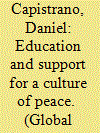

|
|
|
|
|
| Summary/Abstract |
In this article, we discuss the relationship between formal education and public support for a culture of peace, defined here as values and attitudes related to key aspects of peace, such as tolerance, respect and non-violence. For that, we analyzed individual and country-level data from the World Values Survey (WVS) arguing that such data provides relevant evidence to the field of peace studies, and can contribute to explore complex relationships between education and outcomes that are difficult to measure cross-culturally, such as attitudes towards peace. We constructed an index to measure attitudes towards positive peace using WVS items, which reveals significant disparities between countries. We then explored the relationship between this variable and levels of formal education at individual and national levels. We found considerable differences in countries’ levels of tolerance and respect as well as aversion to violence, which is related to education attainment in almost all countries analyzed.
|
|
|
|
|
|
|
|
|
|
|
|
|
|
|
|
| 2 |
ID:
175734
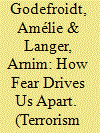

|
|
|
|
|
| Summary/Abstract |
A central aim of terrorism is to drive people apart and destroy social trust. Still, there is little empirical research which has systematically investigated the relationship between terrorist attacks, fear of terrorism, and social trust. In addition, the impact of terrorism is usually assumed to be uniform across different individuals and societies. In order to investigate the impact of terrorism as well as the fear of future terrorism on trust levels of different types of individuals and societies, we combine individual-level survey data of the most recent World Values Survey (WVS, Round 6, 2010–2014) with several indicators at the country-level. Our findings show that social trust is principally damaged by the fear of future terrorist attacks, more so than by past terrorist attacks. Moreover, this deleterious impact of the fear of terrorism on social trust is most prevalent in more democratic countries and among individuals who are more frequently exposed to television news. Hence, with relatively limited capabilities and resources, terrorists may therefore evoke disproportionate fear effects within democratic societies which are, at least partially, fueled by media exposure.
|
|
|
|
|
|
|
|
|
|
|
|
|
|
|
|
| 3 |
ID:
152535
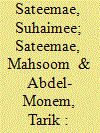

|
|
|
|
|
| Summary/Abstract |
Recent research on Muslim populations has offered interesting but limited insights about values preferences. This mixed-methods study examines the prevalence of support for patriarchy among a sample of religious Muslim university students in Southern Thailand using items from the World Values Survey. It also investigates the durability of these preferences by examining correlations between support or opposition to patriarchal values with preferences towards courtship practices, and elements that influence respondents’ views on gender roles, particularly related to the contemporary socio-economic and political situation facing the Muslim minority of Southern Thailand.
|
|
|
|
|
|
|
|
|
|
|
|
|
|
|
|
| 4 |
ID:
180215
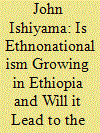

|
|
|
|
|
| Summary/Abstract |
In this paper, I examine whether ethnopolitical identities have grown in Ethiopia since the introduction of Prime Minister Abiy Ahmed’s reforms in 2018, using the most recent Ethiopian survey data from the World Values Survey (wave 5, from 2007 and wave 7, from 2020). I find that although there remains a general popular commitment to a national (Ethiopian) identity, among younger people (especially males) there is a growing sense of an “ethnic” identity and a growing intolerance of other ethnic groups. Further, I find that those who express ethnonational identities are significantly more likely to engage in protest and demonstrations. In conclusion, I suggest that this may not portend well for the future of Ethiopian unity. I also suggest that whether this happens also depends on the institutional transformation of the Prosperity Party (the successor the Ethiopian People’s Revolutionary Democratic Front (EPRDF)) and the level of external support the regime receives from its foreign benefactors.
|
|
|
|
|
|
|
|
|
|
|
|
|
|
|
|
| 5 |
ID:
193194
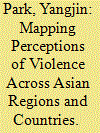

|
|
|
|
|
| Summary/Abstract |
Violence is increasing in Asia. However, limited research exists on the prevalence and types of violence across Asian regions and countries; a comprehensive study on a continental-scale in Asia has been understudied. Guided by the World Health Organization’s definition of violence, this study used World Values Survey Wave 7 (n = 35,435) to map the perceptions of the justifiability of three categories of violence (self-inflicted, interpersonal, collective) with five subtypes (suicide, intimate partner violence against wife, child abuse, violence toward other people, political violence) in six regions and 24 countries in Asia. Findings indicate that perceptions of the justifiability of violence are significantly different across regions in Asia. Perceptions of the justifiability of various types of violence differed across Asian countries. Considering the complexity and diversity of violence across Asian regions and countries, this study may be a cornerstone for violence research in Asia.
|
|
|
|
|
|
|
|
|
|
|
|
|
|
|
|
| 6 |
ID:
151662
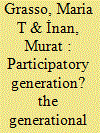

|
|
|
|
|
| Summary/Abstract |
This research aims to understand the extent to which generation and social class determine Turkish respondents’ level of political activism. It tests both the macroeconomic socialization effect and the social class effect on political activism as hypothesized by Inglehart and Lipset, respectively. It also strives to understand whether a macropolitical period effect may also some generational implications for political activism. Beyond these examinations, it also raises a challenge to Lipset’s working-class authoritarianism thesis – within the particular area of political activism – for those generations which came of age under an authoritarian politico-juridical order as well as for those which did not.
|
|
|
|
|
|
|
|
|
|
|
|
|
|
|
|
| 7 |
ID:
192231
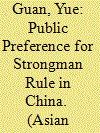

|
|
|
|
|
| Summary/Abstract |
After three decades of collective leadership, strongman rule has returned to China. But do the Chinese people prefer this political system, characterized by a leader with unchecked power? Using four waves of data from the World Values Survey, this study finds, first, that from 2001 to 2018, public preference for strongman rule in China was moderate compared to other countries. Second, the Chinese people expressed a growing desire for a strongman from 2001 to 2007 and again in 2012, but this desire did not increase further between 2012 and 2018. Third, in the 2000s, trust in the central government was negatively associated with strongman preference, while in the 2010s, perceptions of national crisis and political socialization became increasingly relevant. This study evaluates the degree, dynamics, and possible drivers of public preference for strongman rule in China and contributes to the understanding of political strongmen and their popular bases worldwide.
|
|
|
|
|
|
|
|
|
|
|
|
|
|
|
|
|
|
|
|
|